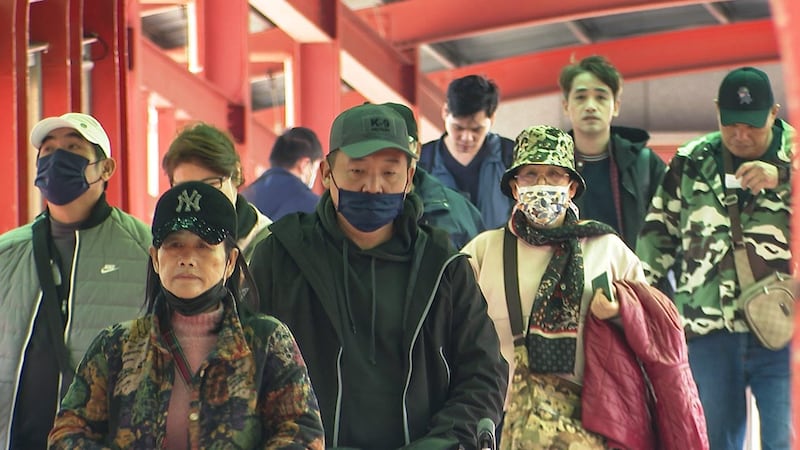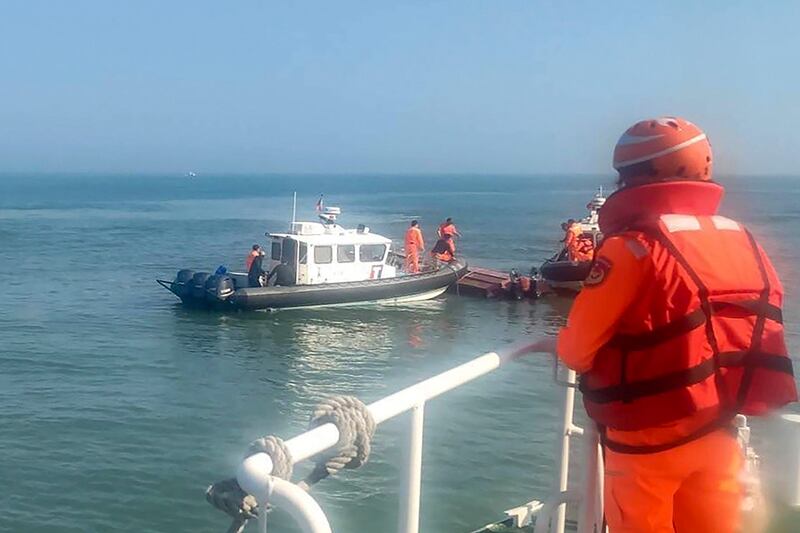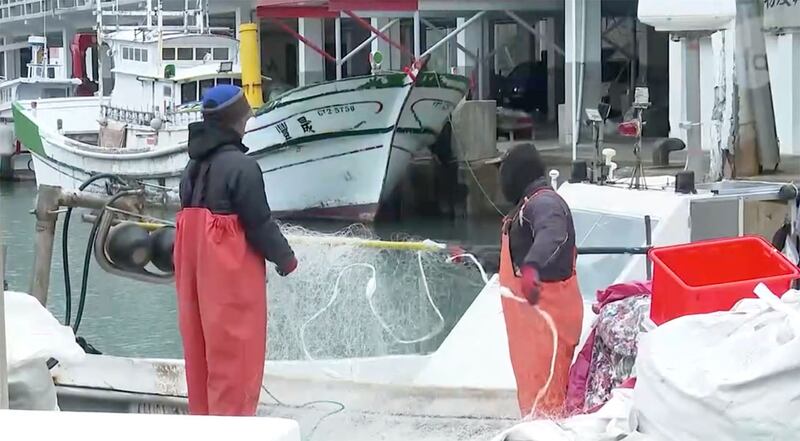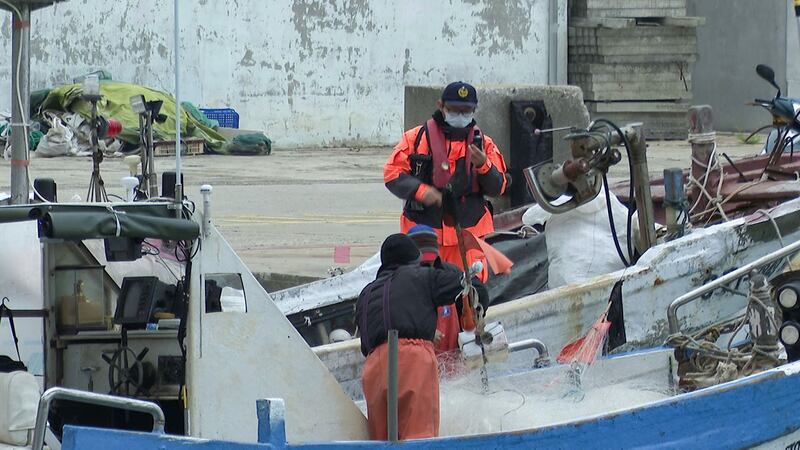Taiwan’s tiny Kinmen island, just six kilometers (four miles) off the coast of mainland China, has become a focal point of fishing and territorial disputes, much to the chagrin of island residents who just want to earn a living in peace.
Tensions have risen following the deaths of two Chinese men when their speed boat capsized after evading inspection by Taiwan’s Coast Guard on Feb. 14 in waters that Taiwan says are restricted around the island, but which Chinese fishermen have increasingly plied.
The incident prompted strongly worded protests from Beijing. Chinese officials said they wouldn't recognize the restricted zone, and soon afterwards China Coast Guard vessels boarded and searched a Taiwanese cruise ship, according to media reports.
Local fishermen told Radio Free Asia that long before the incident, Chinese fishing boats had been helping themselves to fish that were once the preserve of Kinmen's fishing community.
Some have filmed the boats – which often come in the evenings, shining bright lights to attract fish – on their phones, but there's little they can do to stop them.
"Here's a [Chinese] boat that's just like the one that capsized ... going after yellow croaker," a fisherman who declined to be named told RFA, showing footage captured on his phone. "Yellow croaker goes for the highest prices in China."

"This is in a protected area where we're not allowed to fish, but you can see them putting out the nets everywhere — just 50 meters away [from our shoreline]," he said. "Their nets are all across the protected area — several hundred of them."
He said the Chinese fishing boats have also been known to remove nets set by fishing boats from Kinmen, causing economic losses for island residents.
"These are all Chinese speedboats,” he said, pointing to several bright lights in the waters. Once this was “our traditional fishing ground, where we would catch yellow croaker and white pomfret, but now it is a Chinese fishing ground."
Kinmen’s colorful history
Kinmen was occupied during World War II by Japanese forces, who drove Chiang Kai-shek's Kuomintang troops out.
But when the Kuomintang government relocated to Taiwan after losing a civil war to communist forces under Mao Zedong in 1949, they kept most of the Chinese navy and stationed large numbers of troops on Kinmen – which effectively deterred any attempt at a communist invasion.
Kinmen once more became a key battlefield at the beginning of the Second Taiwan Strait Crisis in 1958 when Chinese troops fired nearly half a million artillery shells on the island, which is roughly the size of the New York borough of Brooklyn.
The island is still littered with relics of the Chinese civil war: an abandoned tank on a beach, anti-landing spikes and a World War II era cannon fired to entertain tourists.
There’s also a massive concrete speaker that plays sentimental hits by Taiwanese pop diva Teresa Teng and extols the benefits of a democratic way of life across the busy shipping lane that divides Kinmen from China.
A documentary about the island titled "The Island Between" was recently nominated for an Oscar.
Kinmen's people have been bombed by Allied forces, starved by the Japanese army, forcibly conscripted by China and branded traitors by the authoritarian Kuomintang government in Taiwan.
It's a liminal place that straddles borders of identity and loyalty, and has once more found itself on the front line of a historic conflict that could threaten regional stability.

Today, Kinmen's 197,000 residents have family and history on both sides of the Taiwan Strait, and shuttle regularly by ferry back and forth to the Chinese city of Xiamen. They are wary of talking to journalists for fear that doing so will hurt their businesses, which rely on Chinese customers, or loved ones who are Chinese citizens.
Some have expressed mistrust of the Democratic Progressive Party government in Taipei, especially during the recent dispute over the fatal Chinese fishing boat incident.
At times, the island's loyalties can seem fluid. In 2022, it emerged that one of the island's generals was a Chinese spy who had pledged to surrender the island in the event of a Chinese invasion.
Blaming Taiwanese politicians
If the Chinese fishing boat incursions continue, the island’s fishermen are worried about their livelihoods. Many blame Taiwanese politicians for politicizing the deaths of the two Chinese citizens by making them about cross-Straits tensions, rather than just a private tragedy.
"Those in power over us have never lived like we do, making our living from the sea," one fisherman told RFA Mandarin. "All we care about is getting three meals a day and how much money we'll make today."
"How can a tiny country like ours compete with them over there?"

Many in Kinmen want their government to stop insisting so much on Taiwan's sovereignty and go back to the days of tacit understandings and accommodations.
"We used to have an unspoken understanding with them," another fisherman said. "But our government has broken the rules of the game by escalating, and so the other side has to escalate too."
A fishmonger at Kinmen’s Kincheng Market who gave only the surname Chang told RFA that everyone needs to calm down and start being more polite to each other.
"I want to live in a country at peace, not in the chaos of war," she said.
The United States is bound by the 1979 Taiwan Relations Act to help the island, whose 23 million people have little interest in being ruled by Beijing, to defend itself.
‘Very sensitive’
Meanwhile, the bodies of the two Chinese crewmembers are still in the Kinmen Funeral Home, as officials bicker about how to get them home in the absence of diplomatic ties between China and Taiwan, according to sources on the ground.
"It's very sensitive," a worker at the funeral home told RFA. "Most of us don't know what's happening."
"There have been nearly 20 meetings, and there are a lot of problems, which have become political," she said. "I don't know how things are going to go across the Taiwan Strait."

A Kinmen fisherman who declined to be named for fear of possible reprisals said he had seen Chinese fishing boats "snaking round and circling" Taiwan's Coast Guard vessels, in a manner he described as "provocative."
"They cross the median line [back into Chinese waters] the moment we give chase, and they're always faster," the fisherman said. "Our law enforcement boats can't catch them."
Tensions over fishing grounds are so commonplace that pro-China social media accounts claimed after the Feb. 14 incident that it was caused by a Taiwanese Coast Guard captain whose business interests were being harmed by the Chinese boats.
These claims were later shown to be misleading by the Asia Fact Check Lab, which is affiliated with RFA.
Some said they resented that Taiwan's government had dispatched officials from the Mainland Affairs Council in Taipei, rather than just letting local officials and the Red Cross sort out the return of the two men's bodies.
They also point to what they call dubious claims by the Taiwanese Coast Guard that it has no video footage about the incident.
Reluctant to talk
Many who RFA contacted were wary of giving interviews for fear of reprisals from Beijing, even though they are citizens of democratic Taiwan, suggesting that the Chinese Communist Party's United Front influence operations are already highly developed in Kinmen.
One fisherman commented anonymously: "China allows these fishing boats to fish indiscriminately off Kinmen, without identification plates or skipper licenses, yet the Taiwanese Coast Guard goes to rescue them if they get into trouble in bad weather — we've watched them do this from the shore."

Another complained that the Chinese fishing boats were emboldened by a lack of adequate law enforcement by the Taiwanese Coast Guard, which is supposed to enforce Taiwanese law in waters on Kinmen's side of the strait.
"We've relied on the sea for generations — how are we supposed to get enough to eat?" he said. "They have to regulate it."
Kinmen County Councilor Tung Sen-pao, who has no party affiliation, said there should be mutual recognition of fishing bans to enable stocks to regenerate, yet this is increasingly being ignored by Chinese fishing fleets.
"I don't think anybody wants to see tragic deaths like the ones [on Feb. 14]," Tung said. "Nobody wants to cause this level of heartache."

He said that what's not generally spoken about is the amount of smuggling that goes on between Kinmen and China, a trade that benefits the residents of Kinmen as well as those of China.
"Naturally the fishing community is keeping mum, because if this dispute rumbles on, they will lose those connections, their network, with China. Everybody's income will take a hit if the maritime restrictions are enforced too strictly."
Tung called for better enforcement of Taiwan's fishing bans, which are designed to enable sustainability in the fishing industry.
Chen Shui-yee of the Kinmen Fishermen's Association said the fishing community feels it is caught between, trying to appease both sides at once.
"The fishermen in China aren't organized, so there's no equivalent party we could talk to," Chen said. "So we won't get involved. Our local government never talks to us about these things anyway."
Translated by Luisetta Mudie. Edited by Roseanne Gerin and Malcolm Foster.
